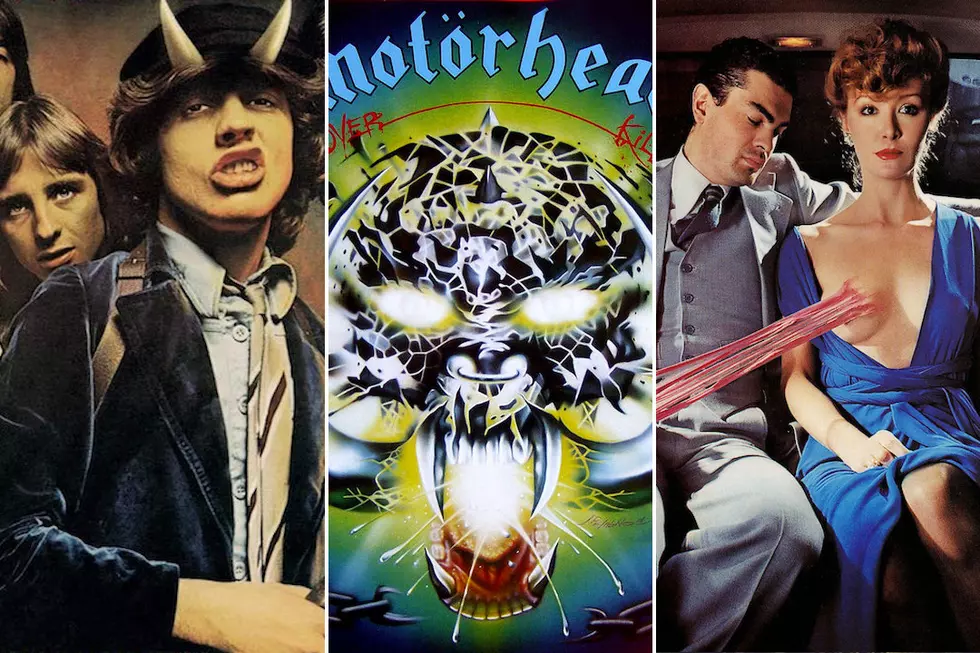
The Secret Hair Metal History of Mr. Mister – and Other Stories
Blink and you nearly missed Mr. Mister. They enjoyed a moment in the spotlight when their second album, Welcome to the Real World, hit No. 1 a few months after its release in November 1985, on the back of chart-topping singles “Broken Wings” and “Kyrie.” But by 1990, they were gone: The band's third LP Go On… flopped, and their label declined to release the fourth. (Pull didn't arrive until 2010.)
But that’s not the full story. Between them, band members Richard Page, Steve George, Steve Farris and Pat Mastelotto notched up significant contributions in the worlds of hair metal, classic rock, mainstream pop and prog, due in part to Mr. Mister’s roots as ace sidemen.
“Steve [George] and I did a lot of session work,” frontman and bassist Page told Popdose. “so much so that we almost got burned out on it. There were days when there would be three or four different sessions that we’d get called to do, and that was just like burnout time. I’m not complaining; it was fantastic and it was a lot of fun. I met a lot of people and producers and artists that ended up recording some of my songs, so it was a great experience. But yeah, we were really raised in the studio session scene and it’s a great life.”
Among Page’s 612 credits are 193 for vocals, including backing Sammy Hagar on “Three Lock Box,” Motley Crue on “Shout at the Devil,” Twisted Sister on “Stay Hungry” and Whitesnake on “Now You’re Gone,” all recorded during the 1982-90 period in which Mr. Mister were together. He also wrote songs for Meat Loaf, Hall & Oates, Celine Deion, Donna Summer and Madonna, plus studio sessions with Rick Springfield, Barbra Streisand and Cher.
Watch Mr. Mister Perform ‘Broken Wings’
Page was invited to join Toto when Bobby Kimball left in 1984, and then to replace Peter Cetera in Chicago the following year, but refused both offers. “Well, a lot has been made of that and it has become sort of like folklore at this point,” Page told Smashing Interviews. But, yeah, there were inquiries way back when Cetera left Chicago and Bobby Kimball left Toto because I knew those guys. It was like an informal, 'Hey, would you be interested?' I was just too busy. I was honored and flattered; just couldn’t do it."
One offer he did accept was to join Ringo Starr’s All Starr Band for five years in 2010, following the departure of his friend Richard Marx. “Ringo called [Marx] asking for recommendations for bass players who could sing and had a couple of hits. My name came up and that’s how it worked out. … Ringo’s a sweetheart and funny as hell, too.”
Listen to Motley Crue Perform ‘Shout at the Devil’
Page’s childhood friend, Mr. Mister keyboardist Steve George, worked alongside him as they recorded vocals for lead artists including Barry Manilow, Al Jarreau and Kenny Loggins, and went on to become Loggins’ musical director in the ‘90s. Page and George pair also appeared on Toto’s “How Many Times” from their Kingdom of Desire album in 1992. George’s studio credits include engineer on 1993 DJ Jazzy Jeff & the Fresh Prince album Code Red, including the global hit "Boom! Shake the Room."
By the time Page and George were putting Mr. Mister together, guitarist Steve Farris already had a brush with the big time: His guitar solo can be heard on the title track of Kiss’s 1982 album Creatures of the Night. Impressed, Paul Stanley and Gene Simmons came close to giving Farris the job of replacing Ace Frehley, but it seems his singing voice let him down. The Mr. Mister opportunity, however, was one he didn’t miss out on.
Listen to Toto Perform ‘How Many Times’
“I had played with a zillion people at this point,” Farris told the Fremont Tribune. “You just knew: This is frickin’ good, man. … I was raised with the idea, and I think this is always something you should raise your children with, which is find out what you want to do and absolutely try to be the best at it and go for it.”
Farris quit the band ahead of their split, feeling that the record label was more interested in presenting Mr. Mister as a solo singer plus hired hands rather than a musical unit – a situation he said he doesn’t place on Page’s shoulders. He went on to work with Dolly Parton, Jennifer Rush, Robin Zander, Edgar Winter and others. He then joined Alice Cooper for the live album A Fistful of Alice in 1996, took part in Whitesnake’s prospective farewell tour in 1997, and appeared on Graham Nash’s 2002 album Songs for Survivors.
Listen to Kiss Perform ‘Creatures of the Night’
Farris later moved on from the music business, but reflected: “I always attribute a lot of my success to where I came from. I wasn’t crazy – I probably did a few crazy things when we were successful – but I had that grounding that came from the great upbringing of my parents, and it played a massive role in my life.”
Drummer Pat Mastelotto had a resume as full as his colleagues’ when Mr. Mister got together, but his work afterward is even more notable. Perhaps most notable are his contributions to the Rembrandts, with whom he can be heard playing on the Friends theme “I’ll Be There For You.” While other pop recordings exist, perhaps his most interesting turn of career came with XTC’s 1989 LP Oranges & Lemons (including the band’s biggest U.S. hit, “Mayor of Simpleton”). That led to a connection with Robert Fripp, and Mastelotto became a member of King Crimson in 1994. He was also involved with a variety of the band’s side-projects before taking part in their 2013 reunion.
Watch XTC Perform ‘Mayor of Simpleton’
Mastelloto said in 2017 that he didn’t see his career progression as any major shift. “In the ‘70s, I was in lots of unknown prog and punk-ish bands around Los Angeles, while also backing lots of singer-songwriters searching for pop hits,” he told Innerviews. “The public perception changed as soon as Mr. Mister had a hit single in the ‘80s. I started getting lots of calls for more pop sessions. I wasn’t playing any differently, but suddenly I was flavor of the week and credible. And one thing led to another, all by word of mouth."
Watch Mr. Mister Perform ‘Kyrie’
His latest association has shifted expectations, Mastelloto admitted. “When I started to play with King Crimson, [fellow drummer] Bill Bruford said to me, ‘Now that you’re in this band, you’ll be known as a rhythm terrorist and you can kiss all those pop gigs goodbye.’ That’s pretty much what happened," Mastelloto said. "Producers and A&R people around Los Angeles must have become afraid I wouldn’t play pop, Americana or roots music anymore. I love to play that stuff too, but the opportunities changed.”
Bach and Roll: See King Crimson Among Best Rock/Classical Crossovers
More From Sasquatch 92.1 FM










